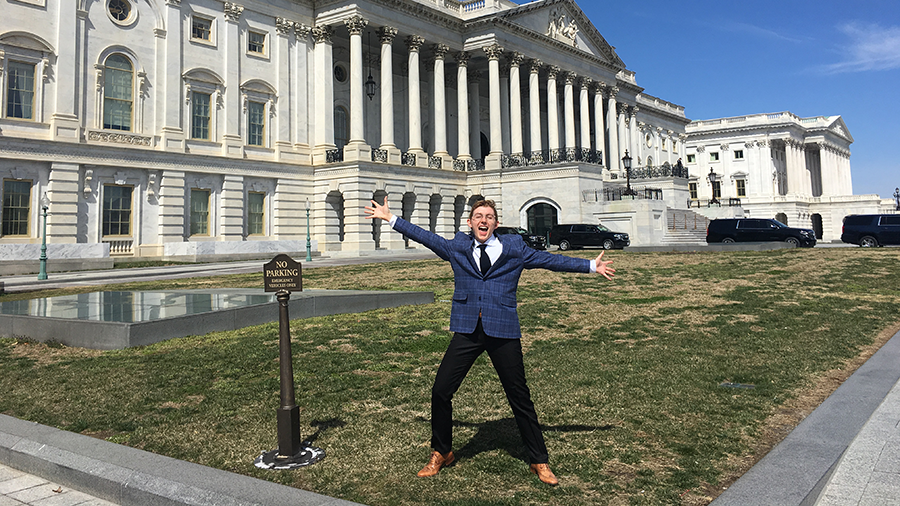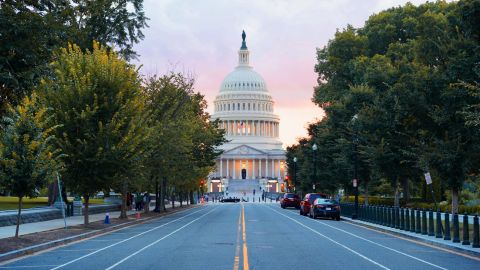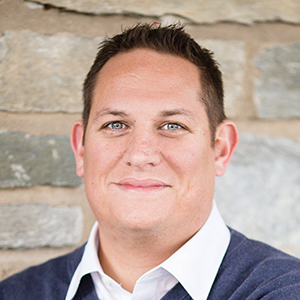Advocates visit Capitol Hill
Twenty undergraduate, graduate and postdoctoral students joined members of the Public Affairs Advisory Committee and public affairs staff to participate in the American Society for Biochemistry and Molecular Biology’s annual Hill Day on March 28, visiting their elected representatives to discuss Congress’ continued support for biomedical research.
.png?lang=en-US) Callan Frye, a graduate student at the Medical University of South Carolina, shows his enthusiasm for advocacy at the ASBMB’s 2019 Hill Day. Courtesy of Callan Frye
Callan Frye, a graduate student at the Medical University of South Carolina, shows his enthusiasm for advocacy at the ASBMB’s 2019 Hill Day. Courtesy of Callan Frye
Although President Donald Trump’s budget request for fiscal year 2020 called for 5 percent cuts to all science funding agencies in the government, the advocates were heartened by the warm reception they received. Martha Cyert, associate chair of biology at Stanford University, said, “It was encouraging to hear staffers share their support for my science and their understanding of the importance of basic research in helping to discover treatments for diseases. They really seem to get it.”
The agenda for this year’s Hill Day advocates focused largely on asking for increases in funding at the National Institutes of Health, the National Science Foundation and the Department of Energy’s Office of Science. But the discussions with lawmakers and their staffs extended to issues beyond funding, indicating a Congress that has a nuanced understanding of and curiosity about how science works.
Kristine Deibler, a postdoc from the University of Washington, was surprised by some of the topics. “My senator’s staff was very direct and interested in hearing about my perspectives related to the issue of sexual harassment in science,” Deibler said. “I was so encouraged to see Congress paying such close attention to this very serious issue.”
This year’s advocates came from 24 states and conducted 83 meetings over the course of their day on the Hill. The student participants, selected from a pool of applicants by the ASBMB’s public affairs staff, arrived in Washington, D.C., the night before Hill Day for a crash course in being an advocate. PAAC members stayed through the following day for meetings with NIH and NSF leaders.
“This Hill Day experience is among the most rewarding opportunities that ASBMB (offers) for its members,” said Matt Gentry from the University of Kentucky, the outgoing PAAC chair. “ASBMB isn’t the only scientific society that holds events like this, but in my experience the organization and staff put on the best show by far.”
Gentry has been a member of the PAAC for five years and is a Hill Day veteran. For some, like Alex Blackburn, a Ph.D. student at the University of Idaho, this Hill Day was their first taste of advocacy.
“This was a very positive, very fun experience,” Blackburn said. “I got to meet really great people on both sides of the aisle. When I get back to Idaho, I look forward to telling my colleagues that they should consider getting involved themselves. I definitely would love to do this again.”
Enjoy reading ASBMB Today?
Become a member to receive the print edition four times a year and the digital edition monthly.
Learn moreGet the latest from ASBMB Today
Enter your email address, and we’ll send you a weekly email with recent articles, interviews and more.
Latest in Policy
Policy highlights or most popular articles

Councilors advocate for science on Capitol Hill
ASBMB Councilors meet with their elected officials to advocate for basic scientific research funding and training the next generation of scientists.

Hope for a cure hangs on research
Amid drastic proposed cuts to biomedical research, rare disease families like Hailey Adkisson’s fight for survival and hope. Without funding, science can’t “catch up” to help the patients who need it most.

Supporting science through advocacy and community building
ASBMB calls on scientists to take action as funding cuts and policy shifts threaten the U.S. research enterprise, emphasizing the power of community advocacy and persistence in protecting the future of science.

Seven steps to advocating in your home state
Find out how to schedule, prepare for and conduct a productive district office meeting to communicate the importance of fundamental scientific research funding to your representatives.

ASBMB members call for funding and agency support amidst uncertainty
In 60 meetings on Capitol Hill, scientists urge legislators to reaffirm support for scientific innovation

Embrace your neurodivergence and flourish in college
This guide offers practical advice on setting yourself up for success — learn how to leverage campus resources, work with professors and embrace your strengths.

